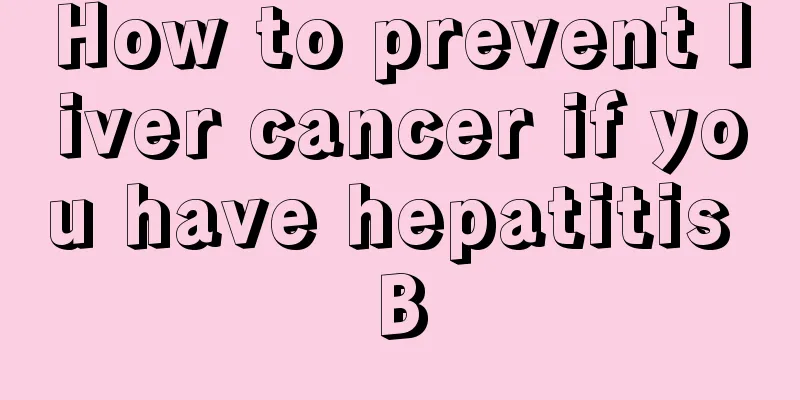How to prevent liver cancer if you have hepatitis B

|
How to prevent liver cancer if you have hepatitis B? Long-term observations show that people with chronic hepatitis B and C virus activity can develop into cirrhosis. The probability of chronic hepatitis C turning into cirrhosis can be as high as 50%-80%, of which 20% can develop into liver cancer. The time span varies, from as short as 10 years to as long as 20 years. Prevention can be achieved from the following aspects: (1) For hepatitis C: Once the diagnosis is established, whether acute or chronic, antiviral treatment should be given as soon as possible. The antiviral efficacy of conventional interferon or long-acting interferon combined with ribavirin in the treatment of acute hepatitis C can reach 80%-90%, which is better than hepatitis B. Studies have shown that antiviral treatment of chronic hepatitis C can also increase the efficacy to 60%-70%. (2) For hepatitis B: antiviral treatment is recommended for patients with HBVDNA (+) and/or HBeAg (+) and abnormal liver function. Currently, the commonly used antiviral drugs are: ordinary interferon, long-acting interferon, lamivudine, adefovir, entecavir, and telbivudine. Adherence to antiviral treatment can continuously suppress HBVDNA levels, convert HBeAg serum, and improve liver biopsy histology, thereby preventing the progression of fibrosis by improving inflammatory necrosis. Treatment must be carried out under the guidance of a doctor and medication cannot be stopped at will. (3) Prevent liver cell necrosis, promote liver cell repair, and improve liver function: The formation of cirrhosis is caused by continuous inflammation and necrosis of liver cells. Therefore, reducing liver cell necrosis and promoting liver cell repair are the key to preventing the development of cirrhosis. For patients with obvious liver damage, we recommend hospitalization. (4) Rest and nutrition: During the active phase of liver disease, it is advisable to rest in bed. After the condition improves, it is advisable to gradually increase the amount of activity to achieve a good combination of work and rest. (5) Those with a history of drinking: must avoid drinking alcohol. It is well known that alcohol can aggravate hepatitis. (6) Avoid using drugs that are harmful to the liver: Many drugs need to be detoxified by the liver, so try to use as few drugs as possible, especially drugs that are harmful to the liver. If you must use drugs, you should do so under the guidance of a doctor. The diet should be high in protein, high in fiber, high in vitamins, and easily digestible. Eat more vegetables, and moderate amounts of carbohydrates and fats. (7) Regular follow-up examinations: Patients with chronic hepatitis B and chronic hepatitis C should go to the hospital for regular follow-up examinations. Regardless of whether their liver function is normal, they should undergo regular B-ultrasound dynamic observations and serial serum tests in order to understand the progression of the disease and adjust treatment at any time. |
<<: How to prevent liver cancer
>>: What to eat to prevent liver cancer
Recommend
How to prevent tongue cancer in general
Life is getting better and better, but diseases a...
Can people with cold stomach take Xiangsha Yangwei Pills?
People with cold stomach must regulate and improv...
What causes hoarseness?
I believe that many friends have experienced hoar...
What should I do if I often have stomach acid? 3 points to tell you the answer
Gastric acid is the hydrochloric acid secreted fr...
What to do if your tongue becomes numb after eating pineapple
Pineapple is a very common fruit, but pineapple s...
How to treat coffee spots, four kinds of diet can help you
Café au lait spots are generally a hereditary ski...
What to do if you have a headache after crying
We all encounter some unpleasant or distressing t...
What are the effects, functions and methods of consumption of red peony root?
Red peony root is a common Chinese medicinal mate...
Pros and Cons of Traditional Chinese Medicine in Treating Bladder Cancer
In recent years, bladder cancer has become one of...
What are the life care after nasopharyngeal carcinoma treatment
What are the daily care after nasopharyngeal carc...
What are the symptoms of liver damage caused by taking medicine
The liver is the largest detoxification organ in ...
Can back pain caused by bone cancer be cured?
Cancer is a very serious disease, I think everyon...
The symptoms of late-stage prostate cancer are very obvious. These 5 symptoms indicate that it has reached the late stage of prostate cancer
As a malignant tumor, prostate cancer often cause...
How is molluscum contagiosum treated?
Molluscum contagiosum is an autoinoculated viral ...
What are the harms of hair dyeing and perming to the body
Dyeing and perming hair has become a fashion, so ...









